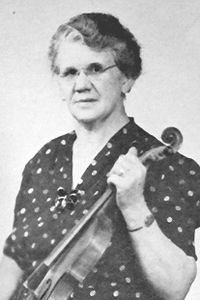Hello! Ask me (almost) anything about traditional music.
Annotation:Johnny Get Your Hair Cut
X:1 T:Johnny Get Your Hair Cut M:C L:1/8 R:Reel S:Sarah Armstrong (near Derry, southwestern Pa., 1943) B:Bayard - Hill Country Tunes (1944, No. 71) K:D A2|dfed B2A2|B2A2F2A2|dfed B2 AA|B2c2e2:|| d2f2a3a|b2a2f2e2|defg a2a2|b2a2f3z| d2f2a3a|b2a2f2e2|dfed B2A2|B2c2 d4|| D2 FG A2 Bc|d3d F2B2|A3A E2B2|A3A F2E2| DEFG A2 Bc|d2d2 F2B2|A4A E2 FE|D4 D2||
JOHNNY GET YOUR HAIR CUT. AKA and see "Granny Will Your Dog Bite? (1)" "Chippy Get Your Hair Cut," "Gippy Get Your Hiar Cut." American, Reel. D Major. Standard tuning (fiddle). AABC. Samuel Bayard (1944) reported that the first part of this tune (unaccompanied by any other strain) was sung in southwestern Pennsylvania to the ditties:
Johnny get your hair cut, hair cut, hair cut,
Johnny get your hair cut, just like me!
and
Granny will your dog bite, etc.--No, child, no!
Joel Shimberg reports that West Virginia fiddler Melvin Wine sang a similar snatch of verse to the tune, "Gippy get your hair cut short like mine." Bayard: "These little refrains are current all over the country, often to entirely different strains of music. In Pennsylvania a playparty song was also sung to this melodic fragment--a set is in Bayard Coll., No. 245; and other sets of this strain, associated with differing secvond parts, are Bayard, Nos. 104, 309. This is the only version known to the editor which is furnished with a third part. It well be noticed that the third section appears to be more modern than the others, and is distinctly inferior--something which can frequently be observed in extra sections arbitrarily tacked onto traditional instrumental airs. The player was rather proud of knowing a set containing three parts instead of the normal two: this attitude is likewise often encountered in similar circumstances. The first part of (this tune), with notes about the various little jingles with which the strain has been associated is in Sandburg, The American Songbag (edition of 1927), p. 158; and a version of the same strain, with a different second part attached, is in Linscott, p. 85" (Bayard, 1944). Some Appalachian fiddler believe "Johnny Get Your Hair Cut" and "Granny Will Your Dog Bite" are different tunes.



